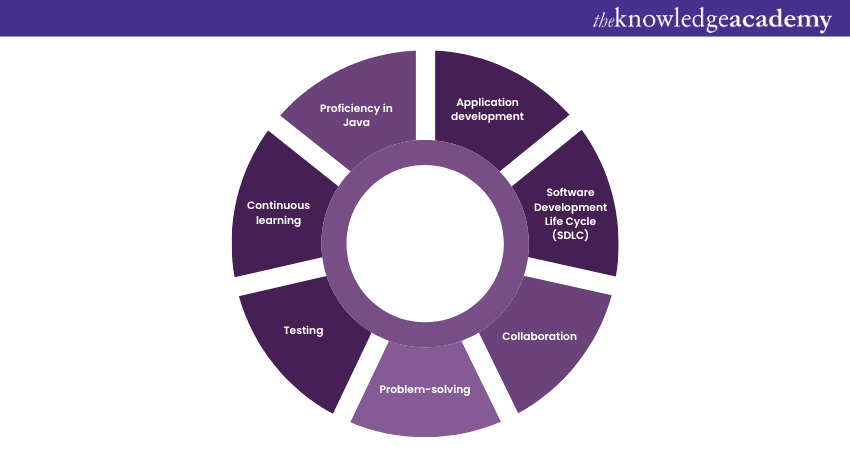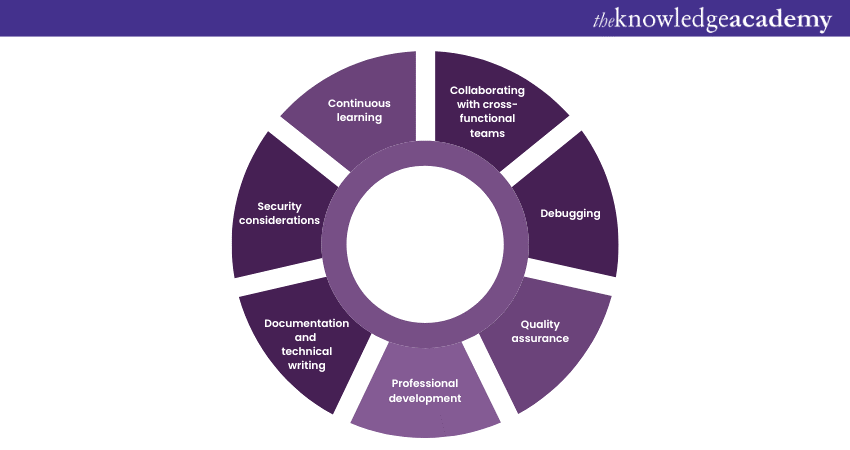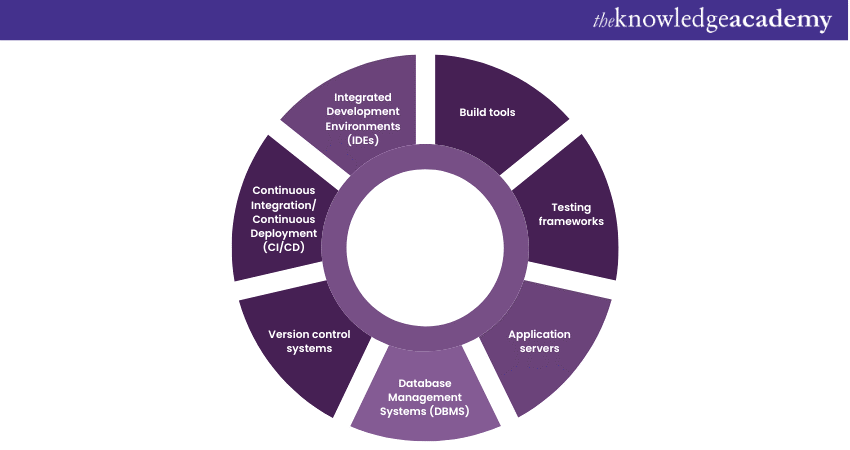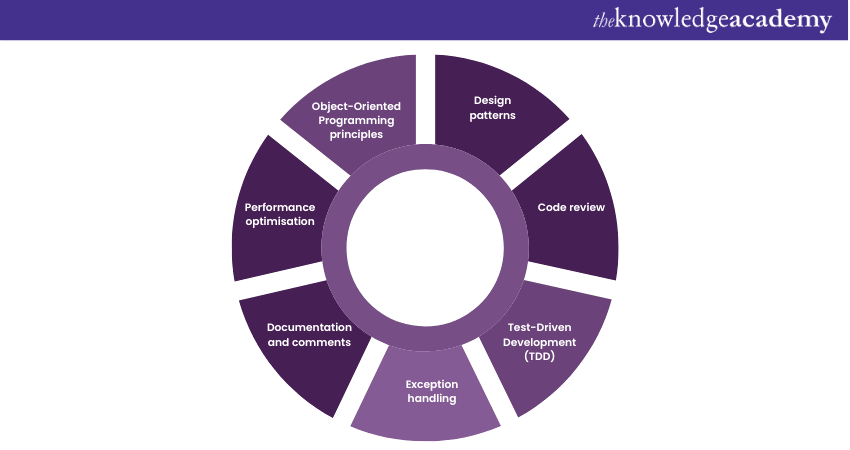We may not have the course you’re looking for. If you enquire or give us a call on +32 35001305 and speak to our training experts, we may still be able to help with your training requirements.
Training Outcomes Within Your Budget!
We ensure quality, budget-alignment, and timely delivery by our expert instructors.

In the ever-evolving world of technology, Java Developers play a crucial role in Software Development. This blog on Java Developer Roles and Responsibilities briefly explains their understanding of Java programming. It will demonstrate their understanding of various frameworks and libraries, enabling them to create robust and scalable applications.
If you wish to explore the Roles and Responsibilities of Java Developers and learn how they contribute to the success of software projects, this blog is just for you. Learn about Java Developer Roles and Responsibilities, including writing clean code and ensuring quality success in the industry.
Table of Contents
1) Understanding the role of a Java Developer
2) Responsibilities of a Java Developer
3) Tools and technologies
4) Best practices for Java Development
5) Conclusion
Understanding the role of a Java Developer

Java Developers play a critical role in the software development process. They are responsible for creating, testing, and maintaining Java-based applications. With their deep understanding of the Java programming language and its ecosystem, Java Developers utilise their expertise in the following roles:
1) Proficiency: Java Developers are extremely proficient in Java programming language and its syntax. They possess extensive knowledge of Java's features, libraries, and frameworks, enabling them to write efficient and robust code.
2) Application development: Java Developers create, test, and maintain Java-based applications. They are skilled in developing software solutions catering to end-users' specific requirements.
3) Software Development Life Cycle (SDLC): Java Developers are involved in all stages of the SDLC. They participate in requirements gathering, architectural design, coding, testing, and deployment, ensuring the successful delivery of high-quality software.
4) Collaboration: Java Developers work collaboratively with cross-functional teams, including designers, testers, and project managers. They effectively communicate with team members to understand project requirements, provide technical expertise, and contribute to the overall development process.
5) Problem-solving: Java Developers possess strong problem-solving skills. They are adept at analysing complex issues, debugging code, and resolving errors to ensure smooth functionality and optimal software performance.
6) Testing: Java Developers conduct thorough testing to verify the software's functionality, reliability, and performance. They write and execute test cases, perform integration testing, and participate in quality assurance processes to deliver a high-quality end product.
7) Continuous learning: Java Developers embrace continuous learning to stay updated with the latest advancements in Java and related technologies. They actively seek opportunities to enhance their skills, attend training programs, and explore new frameworks and tools to deliver cutting-edge solutions.
Interested in becoming a Java Developer? Try our Java Training Courses today!
Responsibilities of a Java Developer

Java Developers have diverse responsibilities throughout the software development process. Their expertise in the Java programming language and their role in creating, testing, and maintaining applications make them invaluable contributors to the success of software projects. Here are some key responsibilities of a Java developer:
1) Writing clean codes: Java Developers follow coding standards and best practices to ensure code readability and maintainability. Well-structured and optimised code reduces bugs, improves performance, and enhances software quality.
2) Collaborating with cross-functional teams: Java Developers work in cross-functional teams, collaborating with designers, testers, and project managers. Effective communication and teamwork ensure successful project delivery. They provide technical expertise, understand project requirements, and contribute to development.
3) Debugging: Java Developers possess strong debugging and troubleshooting skills. They identify and resolve code issues and errors, ensuring the software functions are as intended. Using debugging tools and problem-solving abilities allows them to address challenges during development.
4) Quality assurance: Java Developers conduct unit tests and participate in quality assurance processes. They write test cases and execute tests to verify software functionality and adherence to quality standards. Thorough testing minimises defects and enhances user satisfaction.
5) Professional development: Java Developers continuously learn to stay updated with the latest trends and tools. They participate in training programs, attend conferences, and self-learn to enhance their skills. Continuous learning enables them to deliver high-quality software solutions.
6) Documentation and technical writing: Java Developers document their code, APIs, and system architectures. Comprehensive documentation facilitates software maintenance, onboarding, and support. Technical writing skills help them effectively communicate ideas and ensure knowledge transfer.
7) Security considerations: Java Developers implement security measures to protect applications and data. They understand common vulnerabilities and apply security controls such as input validation and encryption. Ensuring software security builds user trust and safeguards sensitive information.
Learn more about programming in Java with our Java Programming Course!
Tools and technologies for Java Developers

Java Developers work with a wide range of tools and technologies that facilitate their development process and enhance their productivity. These tools and technologies play a crucial role in the efficient creation, testing, and deployment of Java applications. Here are some commonly used tools and technologies for Java Developers:
1) Integrated Development Environments (IDEs): IDEs like Eclipse and IntelliJ IDEA provide comprehensive development environments with features such as code editors, debuggers, and build automation tools. These IDEs offer sophisticated features that streamline coding, debugging, and project management tasks.
2) Build tools: Java Developers utilise build tools such as Maven and Gradle to automate the build process and manage dependencies. These tools simplify project setup, compilation, and packaging, ensuring consistent and reliable builds across different development environments.
3) Testing frameworks: Testing frameworks like JUnit and Mockito are integral to Java Development. JUnit facilitates the creation and execution of unit tests, enabling developers to validate code functionality and detect issues early in the development cycle. Mockito assists in creating mock objects for testing and simulating complex scenarios.
4) Application servers: Java Developers work with application servers like Apache Tomcat and JBoss to deploy and run Java applications. These servers provide a runtime environment where Java applications can be hosted, managed, and accessed. They handle requests, manage resources, and ensure the smooth execution of Java applications.
5) Database Management Systems (DBMS): Java Developers interact with DBMS like MySQL, Oracle, and PostgreSQL to store and retrieve data. They leverage Structured Query Language (SQL) for efficient database manipulation, including querying, updating, and managing relational databases. DBMS enables secure, reliable, and scalable data storage.
6) Version control systems: Java Developers rely on version control systems like Git to manage code repositories, track changes, and collaborate with team members. Version control ensures code integrity, allows for efficient branching and merging, and enables seamless collaboration among developers.
7) Continuous Integration/Continuous Deployment (CI/CD): CI/CD tools like Jenkins, Travis CI, and CircleCI automate the build, test, and deployment processes. These tools enable continuous integration of code changes, automated testing, and efficient software deployment. CI/CD pipelines ensure consistent and reliable software delivery.
Try our Java Programming And Software Engineering Fundamentals Training Course today!
Best practices for Java Development
Java Development follows a set of best practices that ensure the efficiency, maintainability, and scalability of software solutions. These practices enable Java Developers to deliver high-quality code and build robust applications. Here are essential best practices for Java Development:

1) Object-Oriented Programming (OOP) principles: Following OOP principles, such as encapsulation, inheritance, and polymorphism, helps create modular and reusable code. Adhering to these principles ensures code organisation, readability, and adaptability to changes.
2) Design patterns: Utilising design patterns, such as Singleton, Observer, and Factory, among others, offers proven solutions to recurring design problems. Applying design patterns improves code structure, maintainability, and code reuse.
3) Code review: Conducting code reviews and engaging in peer programming enhances code quality. Code reviews help identify issues, ensure coding standards, and promote knowledge sharing. Peer programming fosters collaboration, leading to improved code quality and fewer defects.
4) Test-Driven Development (TDD): Thorough testing is crucial for reliable software. TDD, where tests are written before code, promotes clear requirements understanding. Leveraging testing frameworks like JUnit ensure comprehensive test coverage and automation.
5) Exception handling: Effective exception handling prevents application crashes and ensures graceful error handling. Proper use of try-catch blocks and meaningful error messages improve user experience. Logging exceptions aids in troubleshooting.
6) Documentation and comments: Comprehensive documentation and comments facilitate code understanding and maintenance. Clear explanations and instructions in code documentation aid future development. Well-commented code enhances readability and collaboration among developers.
7) Performance optimisation: Optimising Java application performance is vital. Identifying bottlenecks, using efficient data structures and algorithms, employing caching mechanisms, and fine-tuning database queries improve efficiency. Profiling tools assist in performance analysis.

Conclusion
Java Developers play a vital role in software development projects. Java Developer Roles and Responsibilities vary from writing efficient, clean code and collaborating with cross-functional teams to performing tasks like troubleshooting, conducting testing and quality assurance to ensure the development of efficient and functional websites and applications.
Try our Introduction To Java EE Training Course and learn about Java API in detail!
Frequently Asked Questions
Upcoming Programming & DevOps Resources Batches & Dates
Date
 Java Programming
Java Programming
Mon 20th Jan 2025
Mon 3rd Mar 2025
Mon 12th May 2025
Mon 14th Jul 2025
Mon 22nd Sep 2025
Mon 17th Nov 2025







 Top Rated Course
Top Rated Course


 If you wish to make any changes to your course, please
If you wish to make any changes to your course, please


